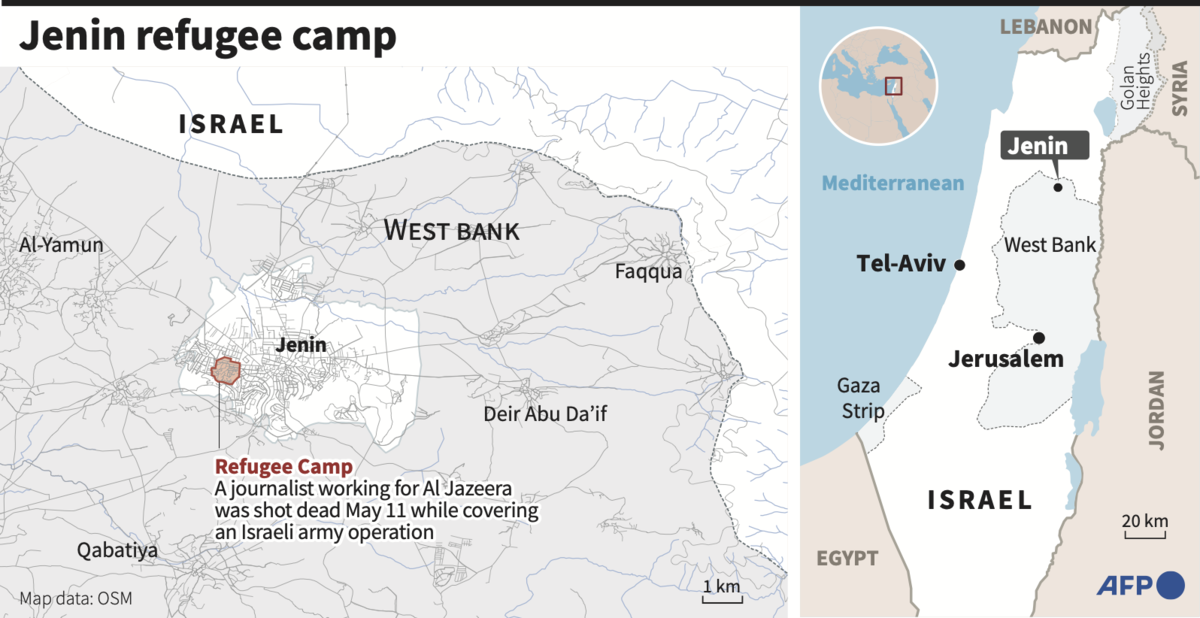RAMALLAH: Israel faced international outrage and demands for an independent inquiry on Wednesday after a veteran US-Palestinian journalist was shot dead in the occupied West Bank.
Shireen Abu Akleh, 51, died after suffering a single gunshot to the head during an Israeli military raid on the outskirts of the Jenin refugee camp.
Abu Akleh’s producer, Palestinian journalist Ali Samoudi, was shot in the back in Wednesday’s incident and taken to hospital, where he was in a stable condition.
Israel initially blamed the shootings on Palestinian gunmen. “It appears likely that armed Palestinians, who were firing indiscriminately at the time, were responsible for the unfortunate death of the journalist,” Prime Minister Naftali Bennett said.
However, as witnesses came forward and video footage of the incident emerged, Israel backtracked.

“At this stage, we cannot determine by whose fire she was harmed and we regret her death,” army chief Lt. Gen. Aviv Kochavi said.
Abu Akleh, who was born in Jerusalem but was a US citizen, worked for the Al Jazeera network in Qatar. She was a respected and familiar face in the Middle East, known for her coverage of the harsh realities of Israel’s military occupation since she joined the network in 1997.
Samoudi, who survived his injury, told Arab News there were no Palestinian gunmen in the area. He described how the news crew advanced up a street carrying their cameras and wearing bulletproof vests on which the “Press” sign was visible.
Samoudi said there were no pedestrians in the street, there was no exchange of fire, and not even stones were thrown toward the troops.
Opinion
This section contains relevant reference points, placed in (Opinion field)
He said Israeli soldiers “suddenly opened fire” on them. “They didn’t ask us to leave and they didn’t ask us to stop. They fired at us. One bullet hit me and another hit Shireen. They killed her in cold blood.”
Numerous videos that have surfaced on social media also show the absence of any violence when the journalists were attacked.
The Palestinian Institute of Forensic Medicine at An-Najah National University in Nablus said the result of a post-mortem examination indicated that Abu Akleh was hit by an explosive bullet that penetrated her head and killed her instantly.
It confirmed that the bullet caused an extensive laceration to the brain and skull, and the weapon used was high-caliber. The deformed bullet is now being analyzed in the laboratory to establish the weapon that fired it.
The Israeli military forces target Palestinian journalists extensively, by shooting, killing, injuring, arresting or beating them, often breaking their equipment.
After mourners gathered at Abu Akleh’s house in Beit Hanina, north of Jerusalem, Israeli police stormed the mourners’ camp, demanding that people dispersed and stopped playing Palestinian nationalist songs and waving flags.
The EU demanded an “independent” probe into the killing and Thomas Nides, the US ambassador to Israel, called for a “thorough investigation” into the killing.
The US State Department said Abu Akleh’s death was “an affront to media freedom.”
The Palestinian Authority said it held Israel “responsible” for Abu Akleh’s death.
The Qatari government, which funds Al Jazeera, condemned the killing “in the strongest terms.”
The Arab League condemned the shooting and blamed Israel. Jordan’s Foreign Minister Ayman Safadi called the killing “a heinous crime.”
Palestinian Prime Minister Mohammad Shtayyeh said: “With sad hearts, we mourn the death of the knight of the media and the icon of the national press. The martyr Shireen Abu Akleh was killed by the bullets of the occupation soldiers while she was carrying out her journalistic duty to document the horrific crimes committed by the occupation soldiers against our people.”
“Whoever was reporting the news became the news herself,” was the top trending hashtag trending on social media following Abu Akleh’s killing.
Elsewhere, the Israeli army shot dead a 16-year-old Palestinian boy in the West Bank city of Al-Bireh on Wednesday.
The Palestinian Ministry of Health said that the boy died after being shot directly in the heart while he was near his school.
























